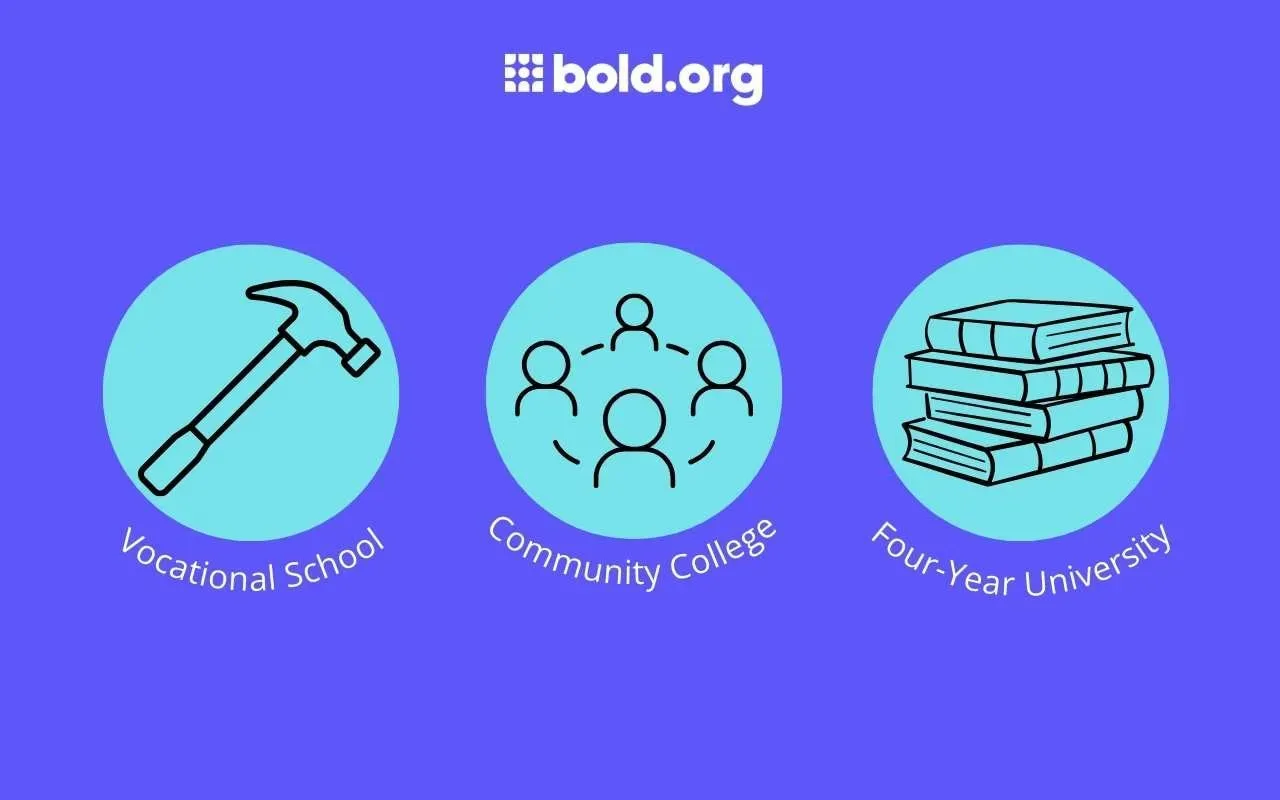What Is Vocational School?

Vocational schools, also known as trade schools, career schools, or technical schools, play a crucial role in our current educational landscape. They offer specialized certificate programs that are tailored to meet the needs of the workforce and the skilled jobs that are essential for our society.
In this guide, we will explore what vocational school is and its importance in developing a strong and skilled workforce. You can expect to learn the essence and benefits of vocational school programs, how these institutions provide a springboard into skilled careers, and the various training options available for different interests and industries.
At Bold.org, we are dedicated to empowering the next generation of scholars. By creating a free applicant profile, you can start saving up for the college education you deserve!

Understanding Vocational Schools
Defining vocational schools succinctly, they are post-secondary educational institutions designed to provide specialized education and training tailored to specific careers. Internationally, many European countries also offer secondary vocational education in which students can choose to matriculate into vocational schools instead of high school or secondary schools as they are known.
The vocational school benefits are manifold, particularly due to the strong emphasis on hands-on learning experiences. Students complete seamless transitions from classroom theories to practical applications.
Imagine electricians perfecting their craft through actual wiring exercises or dental hygienists honing their skills on state-of-the-art simulation equipment; these scenarios exemplify how vocational training molds proficient professionals who can navigate the complexities of their roles from day one.
Create Your Free Profile to Apply for Scholarships Today!Exploring Different Types of Vocational Training Programs
Vocational training programs are known for their wide range of academic training that cater to different industries. These programs offer vocational education specifically designed to focus on developing practical skills needed for specific jobs.
1. Dental Hygienist
Dental Hygienists can benefit from vocational programs that offer comprehensive training in oral health care. These programs typically cover topics like dental anatomy, periodontology, and radiography and can be significantly cheaper than even the cheapest community colleges.
2. Registered Nursing
Another popular choice is the Registered Nursing program. This vocational course equips students with knowledge about patient care, clinical practice, and medical terminology. The curriculum often includes practical training in healthcare centers to ensure students gain hands-on experience.
Get Matched to Thousands of Scholarships
Create your Bold.org profile to access thousands of exclusive scholarships, available only on Bold.org.
Create Free Profile3. Electrician
For those interested in technical trades, becoming an Electrician through vocational education can be an ideal pathway. These programs delve into electrical theory, wiring codes, and safety practices, allowing students to adeptly handle electrical installations and repairs.
4. Business Management
Consider the case of Business Management courses that provide students with a robust understanding of business operations, financial management, business administration, and human resource development, equipping them to enter their workforce without delay. At Hotel Insitute Montreux, 97% of their students are hired upon graduation!
If you're interested in the field of business, check out our business scholarships, catered specifically toward your academic passions!
Key Differences Between Vocational Schools and Traditional Colleges
When deciding on your higher education, you may come across the question of college vs vocational school. Both options have their merits and are suited for different career paths. Here are the main differences between vocational schools and traditional colleges:
1. Practical Expertise vs Academic Knowledge
Vocational schools focus on providing practical skills that directly apply to specific jobs or trades. On the other hand, traditional colleges offer a broader education with an emphasis on academic subjects that may not have direct connections to specific occupations.
2. Cost of Education and Time Commitment
Another important factor to consider is the cost of education and the time required to complete your studies. Vocational programs are typically shorter in duration, ranging from a few months to two years, while a bachelor's degree takes four years to complete. Furthermore, vocational programs often have lower tuition fees and living expenses—a popular option for high school graduates looking for a budget-friendly option.
A Note on Community Colleges
Community colleges bridge the gap between vocational schools and four-year colleges. Offering two-year associate degrees, they are often more affordable than four-year institutions while still providing a variety of majors.
Unlike technical colleges, community colleges prepare students to transfer to four-year colleges rather than entering the workforce immediately. They offer flexibility for part-time or online students while maintaining a theory-based, classroom-style education.
For more information on community colleges and the financial cost of attending one, check out our blog "Is Community College Free?"

Benefits of Vocational School
- Strong Job Prospects: Vocational education often leads to strong job prospects. The skills acquired prepare students to meet the needs of specific industries, making graduates attractive candidates for immediate employment.
- Skilled Worker Demand: Vocational schools are good at adapting their career and technical education to match current industry demands. This ensures that students graduate with relevant and up-to-date skills that directly relate to their vocational majors.
- Financial Stability and Career Growth: By focusing on specialized trades, graduates increase their chances of finding a job and lay the groundwork for financial stability. The expertise gained allows for career advancements within their chosen technical occupations, leading to long-term career growth.
Making an Informed Decision: Choosing Between College and Vocational School
Deciding your education path is a significant step in planning your career. College or a trade school? This question may seem daunting, but with careful analysis of personal strengths, interests, and career goals, the answer becomes clearer.
1. Evaluate Your Interests
When contemplating this decision, start by evaluating your interests. Are you fascinated by a specific occupation, such as culinary arts or electrical work? Or do you have academic pursuits that align more closely with a university degree program?
2. Consider Your Career Aspirations
Your career aspirations are equally important. Vocational training can lead directly to job-ready skills for specific industries. However, college degrees often provide a broader knowledge base that can open doors to diverse fields and provide more opportunities to further education in graduate school.
3. Reflect on Your Learning Preferences
Lastly, reflect on your learning preferences. Do you favor hands-on learning over lectures? Consider your experience in high school and the learning methods that benefited you most. Your preferred learning style should play a crucial role in guiding your choice between vocational school and college.
Another way you can capitalize upon your unique goals and interests is by applying for scholarships. We offer ways to sort them based on state, major, or academic year so you can find the perfect fit!

Taking the First Steps Towards a Rewarding Career: Application and Enrollment Process
Embarking on a vocational education begins with a clear understanding of the vocational school application and enrollment process. The journey to acquiring technical education is straightforward but requires attention to detail.
Application Steps:
- Research Vocational Programs: Identify the programs that align with your career goals. Assess the reputation, success rate, and facilities of various vocational schools to find a suitable match.
- Understand the Requirements: Each program may have its own set of prerequisites. These can range from high school diplomas or GEDs to specific work experiences or skill levels.
- Gather Necessary Documentation: Prepare transcripts, letters of recommendation, a resume, and any certification that supports your application. Some schools might also require a personal statement or an essay explaining why you are a good fit for the program.
- Submit Applications Before Deadlines: Keep track of deadlines for all your chosen programs to ensure timely submission.

Enrollment Process:
- Acceptance Communication: Once accepted, review the offer carefully.
- Financial Planning: Investigate funding options if necessary, including scholarships, grants, or payment plans offered by the institution.
- Enrollment Confirmation: Secure your spot by completing any necessary enrollment forms and paying any required deposits.
- Orientation and Registration: Attend orientation sessions to understand the school's expectations and register for classes to begin your educational journey.
By meticulously following these steps, prospective students can navigate through the application and enrollment phases with confidence. With each document submitted and form completed, you move closer to mastering a trade or skill that can propel you into a rewarding career path.
Feeling anxious about college? We've got you covered with our comprehensive guide on how to survive college!
Building a Strong Foundation for Your Career: Leveraging Resources and Networking Opportunities
Vocational schools offer more than just classroom instruction. They provide a wide range of career resources for vocational students to ensure they are job-ready upon graduation. Job placement assistance and resume workshops are just a few of these.
In addition to leveraging these resources, making industry connections can propel your career forward. Vocational schools often facilitate opportunities for students to network with professionals in their desired fields. This networking can happen through various channels:
- Internships: These offer real-world experience and an inside look at your chosen industry, while also providing an opportunity to make valuable connections.
- Industry events: Participating in these can broaden your network, keep you informed about industry trends, and open doors to job opportunities.
- Online platforms: Platforms like LinkedIn allow you to connect with industry leaders, join relevant groups, and engage in discussions that can boost your visibility within your chosen field.
Building a robust career foundation involves both honing your skills and creating strategic alliances. By capitalizing on the resources offered by vocational schools and actively seeking networking opportunities, you set yourself up for long-term success.
The Future of Work: How Vocational Education Aligns With Industry
The way we work is changing quickly, and technology is a big reason why. In recent years, automation and artificial intelligence are becoming more prevalent, and as a result, vocational education has had to change too. It has had to make sure its programs are keeping up with what industries need.
Think about jobs like cybersecurity, data analytics, or software development. These are fields where knowing how to use technology isn't just helpful - it's necessary. Vocational schools have noticed this shift and are now offering more courses that teach advanced tech skills. Some examples include 3D printing, robotics, and even drone technology.
Vocational schools are also really good at figuring out what industries will need in the future and preparing their students for it. They have strong relationships with local businesses and industries, which means they can work together to create courses that focus on specific job requirements. This collaboration helps make sure that vocational education is always relevant to what employers are looking for.
Whether you've just graduated high school or are thinking ahead to the next major milestone, financial literacy is an important skill to have. Read our guide on financial education for teens to ensure you can sail into your newfound independence with confidence!

Frequently Asked Questions About Vocational School
What other school-to-work programs do schools and institutions offer?
Schools and institutions often extend beyond traditional vocational training by offering apprenticeships, internships, cooperative education (co-op) programs, and dual enrollment options. These programs are designed to bridge the gap between classroom instruction and real-world experience, providing students with exposure to actual work environments.
How widespread is participation in vocational education?
Vocational education enjoys broad participation across various demographics. Many students with a high school diploma enroll in vocational courses, and adults often pursue vocational training for career advancement or a change in profession. The demand for vocational education continues to grow as industries seek skilled labor.
To what extent do students who are disadvantaged or have disabilities participate in vocational education?
Vocational schools strive to be inclusive, offering opportunities for disadvantaged students and those with disabilities. These institutions frequently provide tailored support services, adaptive learning equipment, and specialized programs to ensure all students can access vocational training and succeed in their chosen careers.
Any lingering questions in the back of your mind? Check out our scholarship blog on anything and everything related to education!